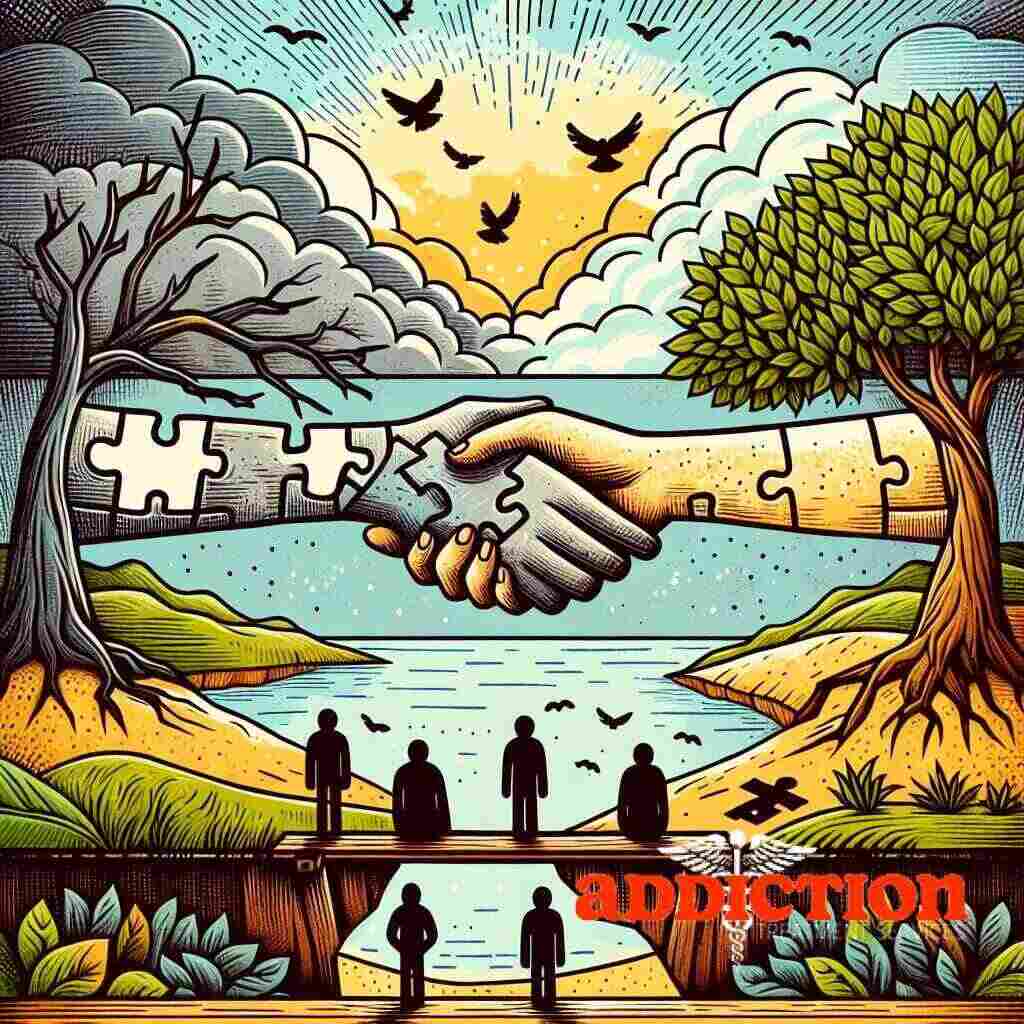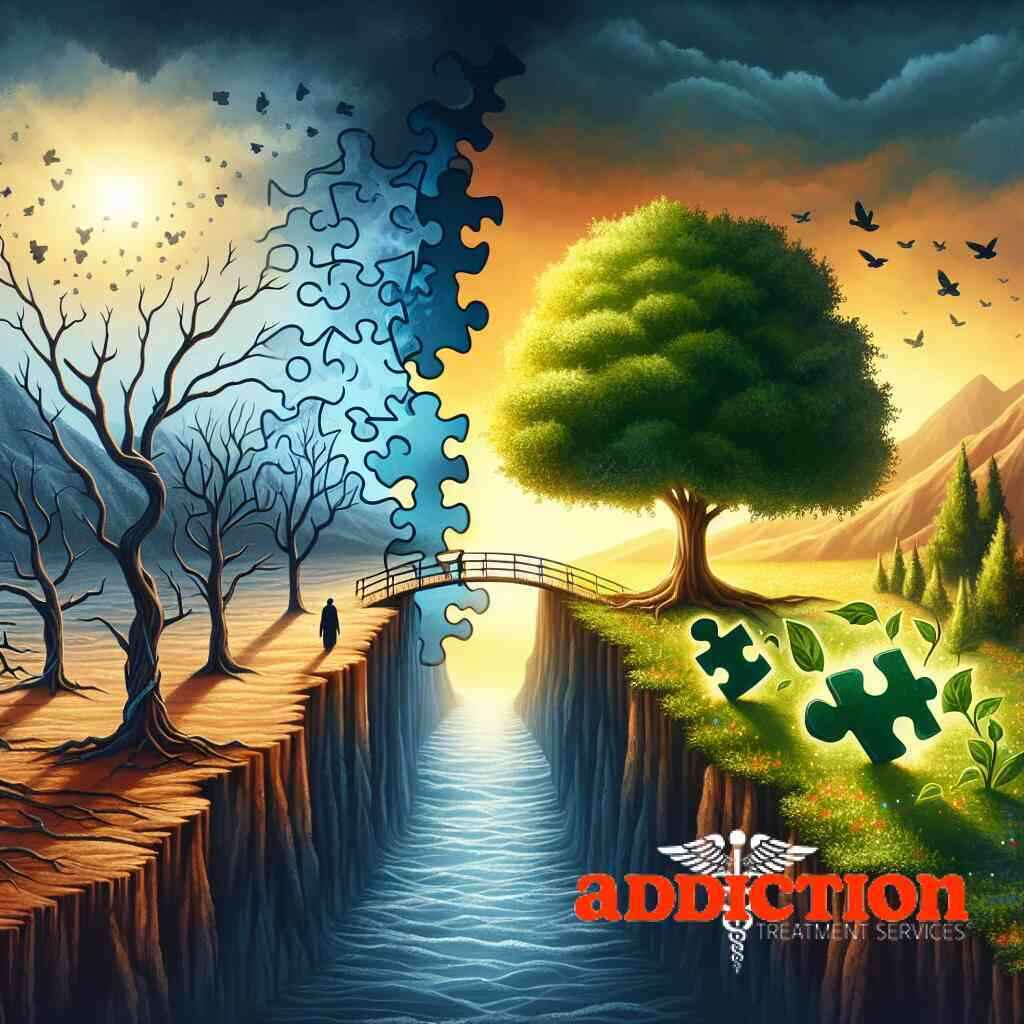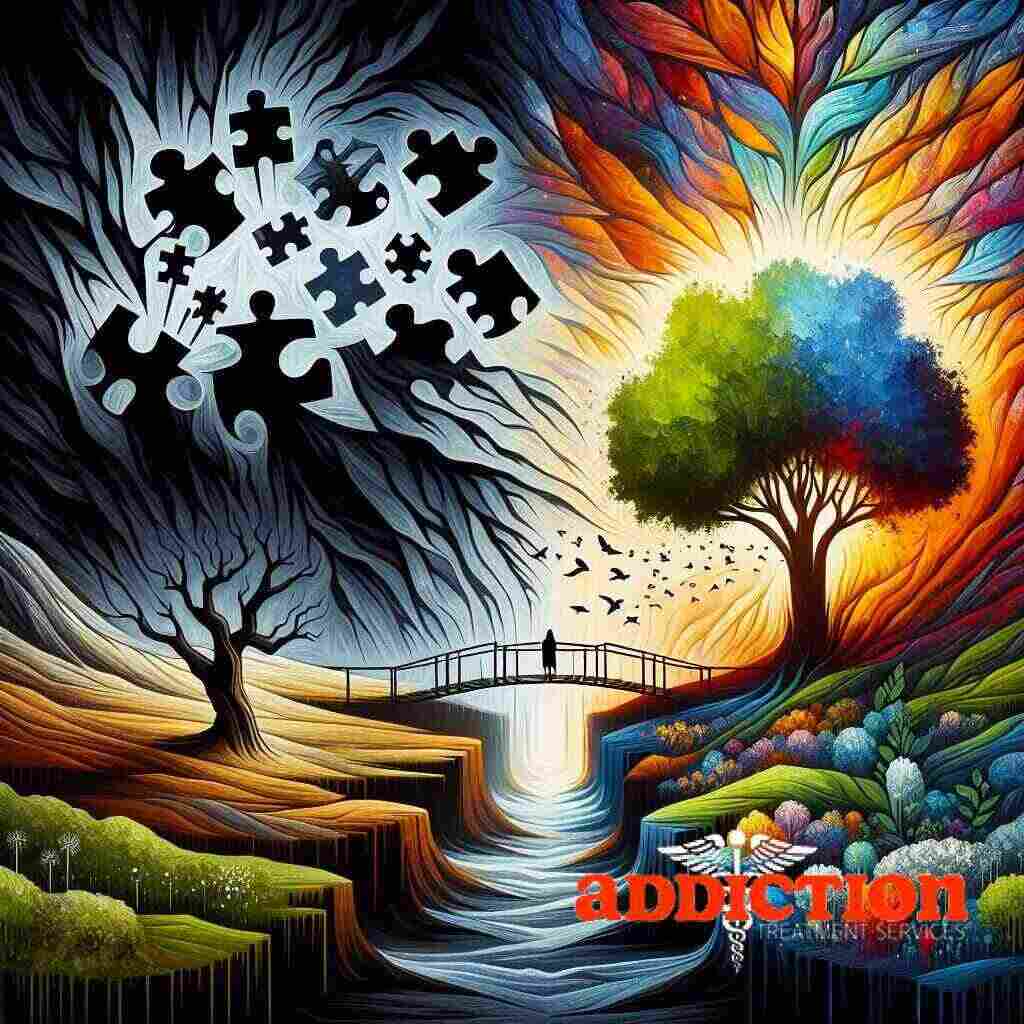 Posted On: 06/19/2024
Posted On: 06/19/2024The Power of Connection in Recovery
Understanding Addiction Treatment Services
At the core of battling addiction lies the understanding that the journey towards recovery often requires comprehensive support and intervention. Addiction Treatment Services, encompassing a spectrum from drug detoxification details to therapy and sober living environments, strives to meet this multifaceted need. The essence of addiction treatment services is not merely about detoxifying the body from substances but involves transforming the whole person-mind, body, and spirit. This holistic approach to recovery acknowledges the power of connection, community, and the necessary tools provided by addiction treatment centers to ensure individuals are not navigating this challenging journey alone. Each service, whether it be residential treatment, outpatient care, or supportive sober living arrangements, integrates the importance of community and peer support as foundational elements in the recovery process.
The Role of Peer Support in Overcoming Substance Use Disorders
Peer support in addiction recovery is a pillar of strength for many individuals grappling with substance use disorders. It offers a platform for sharing experiences, strength, and hope. Peer support groups, such as Alcoholics Anonymous (AA) and Narcotics Anonymous (NA), provide a safe, non-judgmental environment where individuals can learn from others who have walked similar paths. The empathetic understanding and mutual respect found in these groups reinforce the reality that addiction can affect anyone, from any walk of life, and that recovery is possible with the right support. This peer-led approach demystifies the recovery process, making it more accessible and less daunting for newcomers. The bonds formed in these groups often become a significant source of encouragement, fostering a sense of belonging and reducing feelings of isolation and despair commonly associated with addiction.
Introduction to Support Groups: AA Meetings and NA Meetings
Support groups such as AA Meetings and NA Meetings stand at the forefront of addiction recovery efforts, providing an enduring source of hope and resilience for those battling addiction. Rooted in the principles of mutual aid and the shared desire for sobriety, these meetings offer a structured yet flexible framework for recovery. Participants are encouraged to work through the 12-steps, which promote personal accountability, spiritual growth, and the healing power of community. By attending AA Meetings for support and engaging with the sober community, members gain insights into managing cravings, resisting triggers, and rebuilding their lives without substances. These sessions underscore the importance of continuous support, emphasizing that recovery is a journey rather than a destination. NA Sessions further extend this support network, catering to those recovering from drug addiction specifically, enabling a focused environment where individuals can share their unique challenges and victories. Together, AA and NA underscore the therapeutic value of shared experiences and collective wisdom, making them invaluable components of the addiction recovery landscape.
The Foundations of Support Groups
History and Emergence of Support Groups in Addiction Treatment
The inception of support groups for addiction treatment traces back to the early 20th century, with Alcoholics Anonymous (AA) pioneering the way in 1935. The formation of AA marked a significant shift in addressing alcoholism, not just as a moral failing but as a condition that could be overcome with community support and a structured approach to recovery. This revolutionary idea sprouted in the wake of a widespread epidemic of alcoholism, during a time when the medical community often had limited solutions to offer. As AA’s success stories multiplied, the concept of peer-supported recovery expanded, leading to the creation of other groups such as Narcotics Anonymous (NA) which emerged in 1953, tailored to individuals struggling with drug addiction. These groups laid the groundwork for the multitude of support groups that exist today, showing that peer support could fill gaps in traditional addiction treatment modalities, offering hope and practical pathways toward sobriety. The enduring legacy of these organizations underscores their effectiveness in providing solace, understanding, and practical assistance to those navigating the challenges of addiction recovery.
Core Principles of Alcoholics Anonymous and Narcotics Anonymous
At the heart of Alcoholics Anonymous and Narcotics Anonymous are the Twelve Steps, a set of guiding principles for personal recovery from addiction. These steps encourage individuals to admit their powerlessness over their addiction, recognize a higher power that can give them strength, and take inventory of their personal faults while making amends for harm done. The core principles also emphasize spiritual growth, self-reflection, and ongoing personal development as key components of maintaining sobriety. Additionally, both AA and NA foster an ethos of anonymity, providing a safe environment free from societal judgment. This confidentiality encourages candid sharing and fosters deep connections among members. The method’s success is partly attributed to its adaptability, allowing it to be tailored to meet diverse needs, while its grassroots, decentralized structure supports a wide-reaching impact. By prioritizing spiritual and emotional growth alongside physical abstinence, AA and NA offer a holistic approach to recovery that has resonated with millions worldwide.
Mutual Aid Organizations vs. Formal Treatment Programs
Mutual aid organizations like AA and NA differ significantly from formal treatment programs in several key aspects. While formal treatment often involves clinical interventions, such as psychotherapy and addiction drug rehabilitation, mutual aid organizations provide non-professional, peer-led support. This peer support is rooted in shared experiences and mutual understanding, offering a unique form of empathy and encouragement that is distinct from the clinician-patient dynamic. Furthermore, mutual aid groups are typically free to attend and self-sustaining, making them more accessible to a wider range of individuals. They operate on the principle of anonymity and mutual respect, which helps reduce the stigma and isolation that many people with substance use disorders feel. In contrast, formal treatment programs often utilize a variety of medical and therapeutic approaches to treat addiction, including medication-assisted treatment, behavioral therapy, and other integrated services to address co-occurring mental health issues. While formal programs are critical for many in the recovery process, especially during the initial stages of detoxification and stabilization, mutual aid organizations offer enduring support that can greatly enhance long-term recovery outcomes. Combining both approaches can provide individuals with a comprehensive toolkit for navigating the complexities of addiction recovery.
Benefits of Joining a Recovery Support Group
Emotional Support and a Sense of Belonging
Joining a recovery support group such as AA or NA can provide unparalleled emotional support and a profound sense of belonging, which are crucial during the vulnerable phases of recovery from addiction. In these groups, members are embraced by a community that understands their struggles and challenges without judgment. This support is instrumental in alleviating the loneliness and isolation that often accompany substance use disorders. Emotional support fosters a nurturing environment that encourages openness, allowing individuals to express their feelings and fears, share their stories, and receive empathy and encouragement from peers. This sense of belonging reinforces the notion that one is not alone on the journey to recovery, creating a solid foundation for healing and growth. Learn more about the benefits of addiction recovery groups and how they foster a supportive community.
Sharing Experiences and Learning from Peers
One of the most compelling aspects of recovery support groups is the opportunity to share experiences and learn from peers who have undergone similar challenges. This exchange of personal stories, strategies for coping with cravings, and practical advice on navigating life in sobriety is invaluable. Members benefit from the collective wisdom within the group, gaining insights and perspectives that might not be obtainable through individual therapy alone. This process of sharing and learning is reciprocal,as individuals contribute their own experiences, they not only aid in their recovery but also play a critical role in supporting others. The diversity of experiences within these groups ensures that each member can find relatable stories and lessons that resonate, strengthening their recovery journey and broadening their understanding of addiction and sobriety.
Increased Accountability in a Sober Community
Accountability is a cornerstone of recovery support groups, fostering a culture where members are encouraged to take responsibility for their sobriety while also supporting others in their recovery efforts. This mutual accountability is facilitated through regular meeting attendance, sharing progress and setbacks, and through the mentorship and guidance offered by more experienced members or sponsors. The sober community provides a network of individuals committed to maintaining sobriety, creating a collective force that motivates each member to persevere through challenges and celebrate milestones. This heightened sense of accountability helps members to remain conscious of their actions and decisions, playing a critical role in preventing relapse. The support network for maintaining sobriety becomes not just a safety net, but an active framework for sustained recovery and personal development. Support network for maintaining sobriety explores how this community aids in the stabilization of members’ lives beyond addiction.
Mechanics of Support Groups in Addiction Quality
How 12-Step Programs Facilitate Sobriety
The essence of 12-Step programs like Alcoholics Anonymous (AA) and Narcotics Anonymous (NA) in facilitating sobriety cannot be overstated. These programs provide a systematic approach to recovery that is both spiritual and practical. The twelve steps guide members through a process of self-examination, acknowledgment of powerlessness over addiction, making amends for harm caused, and seeking a higher power’s help in overcoming addiction. This journey is not just about stopping substance use,it’s an invitation to personal transformation. By working through the steps, individuals cultivate self-awareness, develop healthier coping mechanisms, and build moral principles that support sobriety and personal growth. Beyond the individual, these programs foster a community environment where members can support for sobriety, reinforcing the idea that recovery is not a solitary endeavor but a shared journey.
The Importance of Regular Meeting Attendance
Regular attendance at support group meetings is a pillar of successful recovery. Meetings are where the theory of the 12 steps is put into practice. They are the forums through which members share their experiences, strength, and hope with others. Consistent participation helps to maintain focus on recovery, provides ongoing support, and helps to prevent relapse. It’s at these meetings that members are reminded they’re not alone, that others have faced similar struggles and overcome them. Regular attendance reinforces a routine and a structure in the lives of individuals recovering from addiction, aspects which are often in disarray during periods of active substance use. Furthermore, meetings are a source of accountability,they’re a commitment to oneself and the group, serving as a regular reminder of the importance of sobriety in one’s life. Engaging with a sober community through NA Sessions for assistance in recovery helps individuals to stay motivated and resilient in the face of challenges.
Role of Sponsors in Providing Personalized Support
A unique and crucial aspect of 12-Step programs is the role of sponsors. A sponsor is someone who has successfully navigated the recovery process and is willing to guide new members through the program. This one-on-one relationship offers personalized support that is rooted in experience and empathy. Sponsors are available to provide guidance, offer moral support, and share practical advice on overcoming the challenges of addiction and recovery. They act as a mentor, a confidant, and sometimes, a lifeline during moments of temptation or crisis. The sponsorship system is a testament to the program’s emphasis on mutual aid and peer support, underscoring the principle that those who have walked the path of recovery can offer invaluable insight and assistance to those who are newly sober. Through this individualized support, members are not just learning about sobriety,they are experiencing it firsthand from someone who embodies the success of the recovery program.
Integrating the discipline of regular meeting attendance and the support of a sponsor creates a robust framework for sobriety. These mechanisms of support groups in addiction recovery showcase the power of structured peer support in achieving and maintaining a life free from substance misuse.
Integrating Support Groups with Other Addiction Treatment Services
Combining Mutual Aid with Professional Addiction Treatment Centers
Integrating support groups with professional addiction treatment services complements the journey towards recovery by blending the invaluable peer support of groups like AA and NA with clinical interventions. This combination bridges the gap between the emotional and social support provided by peer scenarios and the medical, therapeutic care offered by professionals. While support groups offer a sense of belonging, shared experience, and mutual understanding, professional centers introduce structured therapy, detoxification services, and tailored treatment plans to address the multifaceted nature of addiction. Together, they create a comprehensive recovery model that addresses not just the symptoms of addiction, but its underlying causes, encompassing both physical and mental health needs. Additionally, professionals can guide participants in choosing suitable support groups, ensuring their recovery efforts are fully supported from all angles.
The Role of Outpatient and Residential Treatment alongside AA/NA
Outpatient and residential treatment programs offer a level of care and supervision that complements the self-driven effort required in support group attendance. For many, the structure and intensity of a residential treatment program provide a necessary foundation for sobriety, which is then maintained and strengthened through the ongoing support of AA/NA meetings. In contrast, outpatient treatment allows individuals to gradually integrate recovery principles into their daily lives with the backing of a sober community found in support groups. This tiered approach to recovery ensures that individuals can find the right level of care at various stages of their recovery journey. Early intervention and intensive outpatient programs often recommend joining support groups as part of a holistic recovery strategy, ensuring continuous support is available beyond the confines of the treatment facility. Additionally, many treatment programs incorporate the principles of support groups into their therapy sessions, creating a seamless transition for individuals as they move from structured care to independent management of their recovery.
Early Intervention and Intensive Outpatient Programs
Early intervention plays a pivotal role in halting the progression of substance use disorders before they become deeply ingrained. Intensive outpatient programs (IOPs) serve as both a form of early intervention and a step-down treatment after residential care, blending professional support with the flexibility to maintain daily responsibilities. Participants in IOPs benefit immensely from simultaneously engaging with support groups, as this combination reinforces the coping strategies and relapse prevention skills acquired in treatment. Transitioning from intensive care to the peer-led support found in groups like AA and NA encourages individuals to actively apply what they’ve learned in a real-world context, surrounded by a network of peers who understand their struggles. This integration ensures a well-rounded recovery approach, addressing immediate treatment needs while fostering long-term sobriety through community support.
Relapse Prevention and Long-term Recovery
Developing Coping Strategies within Support Groups
Support groups play a pivotal role in developing coping strategies crucial for relapse prevention and long-term recovery. Inside the sanctuary of AA and NA meetings and within the broader sober community, individuals gain access to a treasure trove of collective wisdom on coping mechanisms for substance use. Members share their experiences in overcoming the urge to use, managing stress without substances, and finding healthy alternatives to former lifestyle choices that centered around addiction. Workshops and discussions often focus on real-life scenarios, providing members with the skills and strategies to handle potentially triggering situations. This exchange of practical advice, underpinned by mutual understanding and support, empowers individuals to navigate the complex journey of recovery with a well-stocked arsenal of coping mechanisms.
Learning to identify triggers, implement stress-reduction techniques, and cultivate a balanced lifestyle are among the key coping strategies emphasized in support groups. These tools are not just about avoiding relapse,they’re about building a life where the desire to use becomes less powerful than the commitment to sobriety. Members often speak of the transformative impact these groups have had on their ability to face life’s challenges without reverting to substance use, showcasing the profound influence of peer support in fostering resilience and independence.
Building a Supportive Network for Sobriety Maintenance
The significance of a supportive network in maintaining sobriety cannot be overstated. Recovery support groups inherently understand this, creating environments where lasting bonds are formed, and members feel a deep sense of connection and accountability to one another. These connections extend beyond the confines of meetings, evolving into a comprehensive support network that participants can call upon at any time. The mutual understanding and shared experiences form the foundation of these networks, making them a powerful tool in the battle against relapse.
In addition to the friendships developed in support groups, the role of sponsors adds another layer of personal support, acting as mentors who provide guidance based on their own journey to recovery. This personalized support ensures that individuals never have to face difficult moments alone. The collective strength of these networks offers a safety net that can catch individuals long before they are at risk of relapse, providing encouragement, wisdom, and practical assistance during vulnerable times.
By actively engaging in support groups, individuals not only receive support but also have the opportunity to offer support to others, reinforcing their own commitment to sobriety and enhancing their sense of purpose and self-worth. This reciprocal support fosters a community that thrives on compassion, understanding, and mutual aid, key elements for successful long-term recovery.
Continued Engagement in Recovery Activities
Commitment to ongoing involvement in recovery activities is essential for sustained sobriety. The journey toward recovery does not end upon achieving a certain milestone or period of abstinence,it is a continuous process that requires dedication and active participation in various forms of support and self-improvement efforts. Support groups encourage attending regular meetings, participating in sobriety-related events, engaging in service opportunities, and embracing a lifestyle that prioritizes recovery.
The concept of “working the program” involves more than just showing up,it’s about integrating the principles and practices learned into daily life. From sedulous self-reflection to public service, the actions taken in the pursuit of recovery are designed to reinforce the commitment to sobriety, personal growth, and the well-being of the community.
Engagement in these activities contributes to a sense of progress and achievement. It not only helps to prevent backsliding but also promotes forward movement in personal development and the deepening of relationships within the recovery community. Events such as sobriety anniversaries, community service projects, and educational seminars provide additional opportunities for growth and reinforcement of the sober lifestyle. Through continued involvement, individuals reaffirm their dedication to recovery, weaving sobriety into the fabric of their lives, and ensuring that the journey they undertake is rich with support, learning, and personal fulfillment.
Embracing the Journey Together
The Lifelong Benefits of Participation in Support Groups
Participation in support groups like AA and NA offers a beacon of hope and a roadmap for individuals embarking on the intricate journey of recovery from addiction. The essence of these groups goes beyond the practical aspects of sobriety,they foster an environment where long-lasting transformations are initiated and nurtured. Through regular engagement with fellow members, individuals discover the power of shared stories and the strength that comes from knowing they are not alone in their struggles. This peer-led camaraderie instills a deeper understanding of addiction and personal accountability, reinforcing the commitment to sobriety as a lifelong pursuit. Moreover, the continuous exchange of coping strategies and success stories among group members provides a wellspring of motivation and resilience, crucial elements for sustained recovery and personal growth.
Expanding Your Recovery Toolkit with Addiction Treatment Services
In parallel with the support from groups like AA and NA, leveraging the array of resources provided by Addiction Treatment Services enables individuals to tailor their recovery journey according to their unique circumstances and needs. By finding recovery services near you, you’re not just accessing a wealth of specialized addiction treatment options,you’re opening the door to a comprehensive framework designed to support every stage of the recovery process. From initial detoxification to outpatient care and transitional living arrangements, incorporating these specialized services adds depth to the recovery toolkit. It equips individuals with the necessary medical, therapeutic, and logistical tools to navigate the complexities of addiction recovery. This multifaceted approach ensures a holistic healing experience, addressing not just the symptoms of substance misuse but its underlying causes as well, paving the way for a more resilient, empowered, and sober life.
The Importance of Community in the Path to Recovery
Central to the recovery journey is the understanding that healing happens within a community. The collective wisdom and unwavering support found in support groups provide a solid foundation for recovery. Yet, it’s the larger ecosystem of care-encompassing professional addiction treatment centers, mental health professionals, and sober living communities-that truly amplifies the effectiveness of peer support. Engaging with a community that offers unconditional support and understanding promotes an environment where individuals feel safe to share their vulnerabilities and achievements. This shared experience fosters a sense of belonging, decreasing the likelihood of isolation and relapse. Moreover, the encouragement to participate actively in one’s recovery process, from attending group meetings to seeking professional care, reinforces a culture of mutual aid and continuous growth. Together, these elements illustrate the indispensable role of community in nurturing lasting recovery, underscoring the importance of connection, empathy, and collective endeavor on the path to sobriety.
By embracing the journey together, individuals find that recovery is not just about living substance-free but about rebuilding a life filled with purpose, dignity, and joy. The collaboration between support groups and comprehensive addiction treatment services forms a synergistic alliance, empowering individuals to navigate the challenges of recovery with confidence and hope. This unified approach highlights the transformative power of community, illustrating that when we come together in support of recovery, we forge a path to a brighter, healthier future.
Frequently Asked Questions
Question: What makes peer support groups like Alcoholics Anonymous and Narcotics Anonymous effective in the addiction recovery process?
Answer: Peer support groups such as Alcoholics Anonymous (AA) and Narcotics Anonymous (NA) are effective in the addiction recovery process because they provide a unique platform for emotional support and a sense of belonging, which are crucial during the vulnerable phases of recovery from addiction. These groups operate on the principle of mutual aid and shared experiences, offering a non-judgmental space where individuals can learn from others who have traversed similar paths. By fostering an environment of empathy, understanding, and accountability, AA and NA meetings significantly contribute to the sobriety support network needed for successful long-term recovery. Addiction Treatment Services recognizes the unparalleled value of these groups and encourages their integration with professional addiction treatment services for a holistic recovery journey.
Question: How does participating in group therapy for addiction, like AA or NA Meetings, complement the services offered by Addiction Treatment Services?
Answer: Participating in group therapy for addiction offered by AA or NA Meetings complements the services provided by Addiction Treatment Services by supplying the peer support and sober community engagement that are often missing in individual therapy. While Addiction Treatment Services offers a comprehensive directory of professional addiction treatment centers that include medication-assisted treatment, behavioral therapy, and detoxification services, adding the component of peer-led support groups enhances the overall recovery experience. The shared stories, coping mechanisms for addiction, and relapse prevention strategies discussed in these meetings enrich the recovery toolkit, making the journey towards sobriety well-rounded. Integrating both professional treatment and mutual aid organizations ensures that individuals have access to all necessary resources for overcoming substance use disorders.
Question: In your blog post ‘Why are Support Groups a Popular Treatment for Addiction?’, you mention the benefits of community and connection. How does Addiction Treatment Services help in creating this supportive network?
Answer: Addiction Treatment Services understands the integral role of community and connection in fostering a successful recovery journey, as highlighted in our blog post ‘Why are Support Functions a Popular Treatment for Addiction?’. We help in creating this supportive network by providing an accessible online directory of local addiction treatment centers and recovery support services. This allows individuals battling substance use disorders to find and connect with both professional addiction treatment services and peer support groups in their area. Our platform facilitates the formation of a comprehensive support network, blending the structured care offered by professionals with the emotional assurance and solidarity found in recovery groups like AA and NA. By making these connections easier to establish, Addiction Treatment Services ensures that individuals have a solid foundation for their recovery, built on a community that understands and supports their journey towards sobriety and health.
Question: Can Addiction Treatment Services offer guidance on integrating 12-step programs like AA Meetings into a personalized addiction treatment plan?
Answer: Absolutely, Addiction Treatment Services can offer guidance on integrating 12-step programs such as AA Meetings into a personalized addiction treatment plan. Our platform not only connects individuals with a variety of addiction treatment centers that specialize in different areas of recovery but also provides valuable insights into how mutual aid organizations like Alcoholics Anonymous and Narcotics Anonymous can enhance their recovery journey. By assessing your unique situation and recovery goals, we can recommend how to effectively weave these peer support groups into your overall treatment strategy, ensuring that you benefit from the combined strengths of professional clinical intervention and the supportive sober community. This integrated approach aims to offer a more comprehensive pathway to sobriety, addressing both the clinical and personal aspects of addiction recovery.
Question: What are the key elements to look for in a recovery support service to ensure it complements substance abuse recovery groups?
Answer: When looking for a recovery support service to complement substance abuse recovery groups, key elements to consider include the service’s integration capability with existing support groups, its range of behavioral health services, and its emphasis on creating a personalized recovery plan. The service should offer flexible options that align with the principles of mutual aid organizations, such as respecting the importance of anonymity, community involvement, and peer support. Additionally, it should provide access to comprehensive care options, including intensive outpatient programs, early intervention strategies, and relapse prevention mechanisms that further support the individual’s recovery journey. Addiction Treatment Services prioritizes these attributes in the addiction treatment centers we recommend, ensuring that individuals receive holistic support that enhances their engagement with sober living and lifestyle practices, further empowered by the solidarity and understanding of peer support groups.




